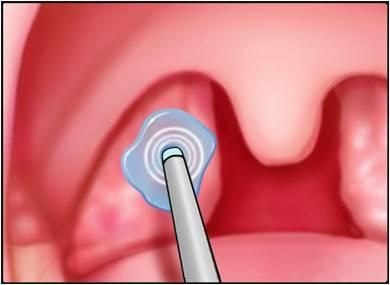Treatment and prevention of pharyngitis with granules
Granular pharyngitis is a common upper respiratory tract disease with chronic progression.
Granular pharyngitis is a common upper respiratory tract disease with a chronic course. The repeated recurrence causes the lymph nodes on the pharyngeal wall to react by swelling to various sizes and look like granules.
High risk for beer and alcohol addicts
Granular pharyngitis is more common in adults than in other groups. The main cause of the disease is the invasion of external agents such as viruses, bacteria and fungi.
A common scenario is that the virus attacks and destroys the lining of the throat, creating favorable conditions for bacteria and fungi to invade, grow and cause inflammation. When the disease is ongoing, the lymph nodes are responsible for supporting and protecting the body against pathogens.
As the disease progresses, many lymphocytes are destroyed, and the lymph nodes work harder and become exhausted. This creates favorable conditions for pathogens to attack the lymph nodes more strongly.
The inflammation increases the size of the lymph nodes, making them appear on the throat wall like granules. In addition, other pharyngitis diseases, if not treated well and completely, their main complication is granular pharyngitis.
People at high risk of pharyngitis are those who are addicted to alcohol and tobacco, often eat spicy, hot foods and are exposed to toxic or polluted environments.
Can cause complications
In the profession, the throat is divided into 3 areas: nasopharynx, mouth and larynx. In normal people, the oral mucosa is smooth and pink in color. When infected, the mucosal surface becomes rough because of raised grains, the color changes from pink to red or purple. Typical common manifestations include:
- Feeling uncomfortable, itchy, dry and burning throat.
- Feeling of phlegm stuck in the throat, especially after waking up. The patient tries to cough it up. The phlegm is usually thick, sticky and milky white.
- Hoarseness and coughing a lot at night, especially after smoking and drinking a lot of alcohol.
- Some patients have fever at different levels.
- When eating or drinking, there is a feeling of choking or something stuck in the throat.
After the above symptoms appear, if not "resolved" promptly, the disease can become more severe, especially in people with low resistance and external pathogens continue to invade.
Granular pharyngitis can cause some complications, especially when there are favorable conditions of weather changes. Common complications include:
- Tonsillitis is caused by granular pharyngitis, widespread infection of the pharynx, progressing to abscess.
- Causes diseases to the entire ear, nose and throat system: Laryngitis, allergic rhinitis, otitis media and sinusitis...
- Coughing up blood (due to frequent coughing causing rupture of small blood vessels), prolonged course causes psychological stress.
- Immune-related diseases: Glomerulonephritis, arthritis...
In some patients with prolonged illness, the lymphoid tissues in the pharyngeal wall enlarge into granules that are continuously and recurrently infected, and the oral mucosal cells are at risk of nuclear transformation and developing into nasopharyngeal cancer.
Therefore, people who have throat problems and "see" the appearance of grains on the palate need to see an ENT specialist for early accurate diagnosis and effective treatment.
Treatment and prevention

Antibiotics are used in cases of confirmed or suspected bacterial infection. Antibiotics are ineffective against fungal and viral infections. Other drugs are prescribed to relieve symptoms, bring peace of mind and comfort to the patient such as fever reducers, sore throat relievers, expectorants, cough suppressants...
For those who do not like to use Western medicine, here are some traditional Oriental medicine treatments that are widely used:
- Garlic:Eating raw garlic directly, processing it into dishes or soaking it in wine to drink every day is very good for sick people. Because garlic contains natural antibiotics that can eliminate bacteria and viruses.
- Honey:Drinking honey mixed with warm water will bring a pleasant feeling to the throat, because honey has antiseptic and anti-inflammatory properties. However, you should be careful to avoid using fake honey on the market.
- Perilla leaves:Perilla leaves have a mild spicy taste, moist properties, and detoxifying effects that are very good for people with respiratory diseases. Perilla leaves are used as raw vegetables or in cooking. In addition, dried perilla leaves are ground into a fine powder for later use, mixed with warm water to drink several times a day.
Note:Folk remedies are often simple and easy to perform with cheap “medicinal ingredients” that are readily available around us. However, the effects of these methods are slow and not immediately apparent.
Therefore, folk methods are only suitable for mild cases and are supportive in nature to alleviate symptoms for patients. Severe and suspected severe cases require intensive intervention by specialists and cannot be treated on their own.
Prevention: Keep your neck warm in the cold season, always keep your mouth clean, eat a suitable and nutritious diet. Minimize exposure to dust and cigarette smoke created by others. Exercise to increase the body's resistance.


